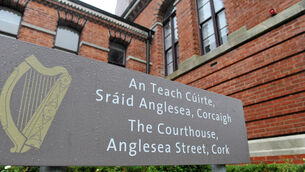'OCD robs you of the joy of living': Cork counseller on the debilitating condition

A CORK mother suffering from OCD took an alternative route on the school run after becoming consumed by fears she might throw her children off a bridge.
This was just one of the extreme and heartbreaking examples of Obsessive-compulsive disorders that Paul McCarthy is coming up against in his work as a Cognitive Behavioural Therapist. The Cork man — who uses CBT to help people alter unhelpful thinking patterns — reminded sufferers there is hope in spite of the debilitating challenges often presented by the disorder. He referred to one particular case of a woman who has turned her life around after a battle with Harm OCD — a condition which takes the form of unwanted thoughts involving self-harm or violence towards others.
“OCD robs you of so much,” he said. “It robs you of the joy of living and enjoying your own kids. I had a lady who would travel the long way to school with her small children to avoid the motorway bridge. She had been experiencing fears at the time that she might stop the car and throw her children off it.
“In reality, the kind of person who would do something like this is impulsive — the complete opposite to somebody with OCD. One of the key things I have picked up across the board is the belief that something bad will happen. In actual fact, something bad has already happened and it’s called OCD.”

According to Mr McCarthy, overcoming such fears and compulsions takes time and dedication. “It’s a gradual process. Eventually, this woman started off driving over the bridge with their partner and children before they were finally able to do it alone.”
He underlined the emotional toll this can take on a person. “Normally, there is a lot of guilt and fear that comes with having these sort of thoughts. The person ends up asking themselves ‘what kind of a mum am I to be even thinking this way?’ For many, it’s shame-driven so very often the therapist may be the first person they have told. The most important part is helping people distance themselves from their thoughts and realise that just because they think something doesn’t necessarily mean it’s the truth.”
He spoke about how difficult it can be for OCD sufferers to shed the bizarre rituals taking over their lives.
“If you are pulling on a rope there is a tug of war but if you let go of the rope altogether there isn’t a war anymore.”
Mr McCarthy, who owns a private practice in Cobh, recalled how a client was unable to welcome visitors into his home as a result of the illness. “One man hadn’t let anyone into his home for four years because he was afraid that visitors might be carrying dirt on them. This was extremely difficult on his wife. He had even adopted a routine where he had “indoor” and “outdoor” clothes. His indoor clothes had never seen the outside before and he would change into them as soon as he got inside the house after becoming convinced they were contaminated. Ironically, he would also wash the bottle of shower gel before showering.”
Slowly, but surely, the situation eased and the OCD sufferer was able to allow visitors into his home again. “He started bringing family members over at the start, before allowing a trusted friend in. Younger nieces and nephews were the final visitors to be let in. This is because young kids tend to like rolling around in the dirt a lot so in his mind they posed a greater risk.”
The therapist warned the public not to allow the line between OCD and so-called quirky traits to become blurred.
“It’s important to normalise the fact that we all experience bizarre thoughts from time to time. Unfortunately, people with OCD tend to get stuck in them, which causes a lot of fear and anxiety. We have to remember that thoughts are intrusive by their very nature so we cannot control what comes into our heads. It’s how we engage with our thoughts that’s important.
Often times, people will refer to a quirky trait — that has no social or emotional impact — as OCD. This can be very upsetting for somebody who actually suffers from the condition as it can be so debilitating.”
He concluded with a word of warning for those considering CBT.
“If you are considering seeing a CBT therapist make sure they are accredited with either Irish Association of Behavioural and Cognitive Psyothertherapies (IABCP) or Cognitive Behavioural Psychotherapy Ireland (CBPI).”
- To find out more information on OCD and the supports available to those living with the condition visit http://www.ocdireland.org/










 App?
App?


